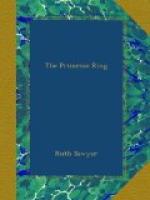In the house left by the Richest Trustee a little gray wisp of a woman sat huddled in a great carved chair close to the hearth, thinking and thinking and thinking. The fire was blazing high, trying its best to burn away the heart-cold and loneliness that clung about everything like a Dover fog. For years she had ceased to exist apart from her husband—her thoughts, her wishes, her interests were of his creating; she had drawn her very nourishment of life from his strong, dominant, genial personality. It was parasitic—oh yes, but it had been something rarely beautiful to them both—her great need of him. The need had grown all the greater because no children had come to fill her life; and the need of something to take care of had grown with him. Their love, and her dependence, had become the greatest factors in his life; in hers they were the only ones. Therefore, it was hardly strange, now that he had died, that she should find it hard to take up an individual existence again; to be truthful, she had found it impossible—she had not even existed.
The habit of individual, separate thinking had grown rusty, and as she sat before the hearth ideas came slowly. The room was dim—lighted only by the firelight; and in that dimness her mind began to stir and stretch and yawn itself awake, like a creature that had been hibernating through a long, dark winter. Suddenly the widow of the Richest Trustee broke out into a feeble little laugh—a convalescing laugh that acted as if it was just getting about for the first time.
“I haven’t the least idea what is the matter with me,” she said, addressing the fire, “but I think—I think—I’m becoming alive again.”
The fire gave an appreciative chuckle—it even slapped one of the logs on the back; then it sputtered and blazed the harder, just as if it were ashamed of showing any emotion.
“It is funny,” agreed the little gray wisp of a woman, “but I actually feel as I used to when I was a little girl and Christmas Eve had come, or Hallowe’en, and—and— What other night in the year was it that I used to feel creepy and expectant—as if something wonderful was going to happen?”
The fire coughed twice, as if it would have liked to remind her that it was May Eve, but felt it might be an intrusion.
“I believe,” she continued, speculatively—“I believe I am going to begin to think things and do them again; and what’s more, I believe I am going to like doing them.”
The fire chuckled again, and danced about for a minute in an absurd fashion; it was so absurd that one of the logs broke a sap-vessel. After that the fire settled down to its intended vocation, that of making dream-pictures out of red and gold flames, and black, charred embers.
The widow of the Richest Trustee watched them happily for a long time, until they became very definite and actual pictures. Then she got up, went to her desk, and wrote two letters.




